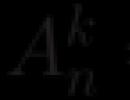School exam schedule. How to find out the schedule of the exam, oge and gve. How to register for participation in the GIA
The exam is held according to a single schedule, which is annually approved by order of the Ministry of Education and Science of the Russian Federation.
Exams are held in three stages: early, main and additional (September).
Official schedule of the Unified State Examination 2017
In accordance with the timetable, exams in 2017 will be held in three stages: early, main and additional.
The early stage of the exam in 2017 will be held from March 14 to April 7. The main one is from May 29, 2017 to June 30.
The exam in the Russian language and mathematics of the basic level can also be passed in an additional period - from September 4 to 15.
As in 2016, the schedule, along with the reserve terms for conducting the Unified State Examination, the OGE and the GVE in individual academic subjects, provides for an additional reserve day for exams in all academic subjects. It is necessary for those participants who for some reason could not participate in the exam on the main or on the reserve day, for example, due to the coincidence of two selected subjects on the same day or absence for a good reason.
Dates of the Unified State Examination 2017
The early examination period, which is held in March-April, is intended mainly for graduates of previous years.
The main period is traditionally organized in May - June in all subjects for all graduates of the current year.
In the additional period in September, exams are held in compulsory subjects - Russian language and mathematics at the basic level.
Students who have not passed the state final certification in compulsory subjects have the right to take exams in September.
Graduates who have received a certificate of secondary general education and wish to improve satisfactory results in these subjects are not allowed to participate in the Unified State Examination in September. They can retake the exams no earlier than one year later.
To participate in the USE, it is necessary to submit an application by February 1 (inclusive), which should list the subjects for which the participant plans to take the USE. The application can include any number of items.
School graduates of the current year apply for the USE at the place of study. The rest of those who wish must apply to the places of registration for passing the USE, determined by the educational authorities of the subject of the Russian Federation.
All students intending to graduate from secondary education in 2017 will be required to pass the Unified State Examination, a unified state exam aimed at assessing a student's knowledge acquired throughout school life. Passing the exam is always accompanied by stress not only on the part of the children themselves, but also their parents and even teachers who are worried about their pupils. Therefore, the question of how many USE in 2017 worries everyone interested long before the end of the next one.
Dates for the exam in 2017
It should be noted that the USE in 2017 will be held in two stages: early (trial) and, accordingly, the main one. According to the project of Rosobrnadzor, the trial stage of the USE-2017 will be held from March 14 to April 7 , and the main from May 26 to June 30, 2017 .
Trial and main stages
So, the USE-2017 will be held in two stages: early (preparatory) and main. An early stage is necessary in order to familiarize the student with the technique of passing the required subject at the Unified State Examination, to exclude the possibility of a "first fright" when a graduate may get lost from an unusual form of passing the exam. In addition, at this stage, students get acquainted with the form of asking questions, with the level of tasks and can independently and with the help of teachers assess their real level of preparation for passing the subject. The good news is that the trial level passes in advance, which gives the graduate time to improve knowledge and get a decent grade.
USE 2017 - exam schedule 
Thus, the preparatory stage will traditionally take place from 14.03 to 7.04. In turn, the main stage of the unified state exam is planned to be held from 26.05 to 30.06. It is this stage that will become decisive in the struggle for a worthy certificate.
Required subjects in 2017
We note right away that the various changes in the USE 2017 do not affect the compulsory subjects, as before, in order for graduates to receive a certificate, they will need to pass the following compulsory subjects, such as: mathematics and Russian. According to Rosobrnadzor experts, in the coming years, it is not planned to add a new subject to the list of compulsory ones, only after 2022, the compulsory subjects of the Unified State Examination will be replenished with another compulsory subject - a foreign language.
All other subjects are optional, and for this reason, they are taken by graduates on a voluntary basis, based on their choice for entering universities of a certain direction.
USE-2017: changes, latest news
The Ministry of Education of the Russian Federation is talking about the abolition of the test mode for passing the exam. This idea arose due to the fact that some students who did not know how to solve a particular problem could simply choose an answer and guess it randomly. According to the latest data, since 2017, Rosobrnadzor plans to abandon tests, in almost all subjects of the Unified State Exam-2017, including: in biology, physics and chemistry.
Rosobrnadzor will begin to approve the methodology by which the minimum score in 2017 will be calculated for the unified state exam.
Introduction of the oral form of surrender. In order to pass the Russian language or history, students will need to pass an oral exam in order for their level of preparation to be assessed to the fullest.
More than 700,000 graduates of the 11th grade in 2017 will take the exam. Despite the spring days, it's hard to rejoice: exam dates are approaching at an alarming rate. On what days are the most terrible tests of the examination epic prepared for graduates? When will I have to take the mandatory USE in mathematics and the Russian language in 2017? What to expect and what to prepare for? Forewarned is forearmed! Or in Latin - prei monituse, prei minituse!
The official schedule of the exam in 2017
On the official website of the FIPI (Federal Institute of Pedagogical Measurements), the document with the approved USE schedule in 2017 has not yet appeared, but it has already become known that the dates for the state exams this year have been approved by the Russian Ministry of Education and Science.
USE schedule in 2017
As in the previous year, in 2017 exams will be held in three stages: early, main and additional.
| date of | Subject |
| early period | |
| March 23 (Thu) | geography, informatics and ICT |
| March 27 (Fri) | Russian language |
| March 29 (Wed) | history, chemistry |
| March 31 (Fri) | math B, P |
| April 3 (Mon) | foreign languages (oral) |
| April 5 (Wed) | foreign languages, biology, physics |
| April 7 (Fri) | social science, literature |
| April 10 (Fri) | reserve: geography, chemistry, informatics and ICT, foreign languages (oral), history |
| April 12 (Wed) | reserve: foreign languages, literature, physics, social studies, biology |
| April 14 (Fri) | reserve: Russian language, mathematics (basic and specialized) |
| Main period | |
| May 29 (Mon) | geography, informatics and ICT |
| May 31 (Wed) | mathematics (basic) |
| June 2 (Fri) | mathematics (profile) |
| June 5 (Mon) | Social Studies |
| June 7 (Wed) | physics, literature |
| June 9 (Fri) | Russian language |
| June 13 (Tue) | foreign languages, biology |
| June 15 (Thu) | foreign languages (oral) |
| June 16 (Fri) | foreign languages (oral) |
| June 19 (Mon) | chemistry, history |
| June 20 (Tue) | reserve: geography, informatics and ICT |
| June 21 (Wed) | reserve: literature, chemistry, physics, social studies |
| June 22 (Thu) | reserve: biology, history foreign languages |
| June 23 (Fri) | reserve: foreign languages |
| June 28 (Wed) | reserve: mathematics (basic and specialized) |
| June 29 (Thu) | reserve: Russian |
| July 1 (Sat) | reserve: in all subjects |
| Additional period | |
| September 5 (Tue) | Russian language |
| September 8 (Fri) | mathematics (basic) |
| September 16 (Sat) | reserve: mathematics (basic), Russian language |
Thus, from March 23 to April 14, the early stage of passing the exam will be held, and from May 29 to July 1, the main stage of passing exams will be held. An additional stage will take place from 5 to 16 September.
Briefly and schematically, the standard USE schedule for a graduate will look like this:
- May 29 - geography and informatics and ICT;
- May 31 - basic level mathematics;
- June 2 - profile level mathematics;
- June 5 - social studies;
- June 7 - physics and literature;
- June 9 - Russian language;
- June 13 - foreign language (without speaking) and biology;
- June 15 - speaking in a foreign language;
- June 19 - chemistry and history.
By the way, the GVE for eleventh graders will be held according to a similar schedule. True, a foreign language will be held on one day - June 13th. As for the USE in mathematics at the profile level, it is not provided for within the GVE.
On a note! Ninth graders will also be subjected to examination tests. The main stage of the OGE for them has the following schedule:
- May 26-27 - foreign language;
- May 30 - Russian language;
- June 1 - history, biology, physics, literature;
- June 3 - physics, informatics and ICT;
- June 6 - mathematics;
- June 8 - social science, geography, chemistry, computer science and ICT.
Note that ninth-graders will take GVE according to a similar schedule.
Compulsory exams and electives
The list of disciplines that must be passed at all costs traditionally includes the Russian language and mathematics. Although from 2017, they are going to add one more mandatory subject to these subjects. True, it is not yet known what kind of object it is. There are several contenders for this role: a foreign language, social studies, physics and history.
Today it is known that you need to take only four exams: two mandatory and two optional. The graduate must determine the subjects of his choice, depending on what specialty he plans to enter at the university.
The list of USE exams for choice for 2017 consists of 12 subjects:
- literature;
- history;
- Social Studies;
- biology;
- physics;
- chemistry;
- geography;
- informatics and ICT;
- English;
- German;
- French;
- Spanish.
Time of the exam in 2017
Exams in all subjects will begin as usual at 10 am local time. The time allotted for passing the examination tests also remained unchanged:
- social studies - 235 minutes;
- history - 235 minutes;
- Russian language - 210 minutes;
- literature - 235 minutes;
- profile level mathematics - 235 minutes;
- basic level mathematics - 180 minutes;
- chemistry - 210 minutes;
- physics - 235 minutes;
- informatics and ICT - 235 minutes;
- biology - 180 minutes;
- geography - 180 minutes;
- foreign languages - 180 minutes (plus 15 minutes for the "Speaking" section).
Attention! The time to pass the exam in biology has increased by 30 minutes compared to the previous year. And in 2017, the time for the biology exam will be 3 hours and 30 minutes.
Minimum scores for the exam in 2017
The minimum number of points according to the results of the Unified State Examinations is different for those graduates who just want to get a certificate, and for those who plan to enter a university.
Minimum USE scores for admission to a university
In Russian, you need to score 36 points.
The results of the Unified State Examination at the profile level of mathematics will be needed for those who intend to enter a university that includes the subject "Mathematics" in the list of entrance examinations.
- mathematics (profile) - 27 points;
- mathematics (basic) - 3 points (assessment).
Minimum USE scores for obtaining a certificate
- in Russian - 24 points;
- in mathematics at the profile level - 27 points;
- in mathematics of the basic level - 3 points (assessment);
- in physics - 36 points;
- in chemistry - 36 points;
- in computer science - 40 points;
- in biology - 36 points;
- in history - 32 points;
- in geography - 37 points;
- in social studies - 42 points;
- in literature - 32 points;
- in foreign languages - 22 points.
Changes and innovations in the USE-2017
As mentioned above, it is planned to add one more to the two compulsory subjects for passing the exam, but which one is unknown.
A rather important change that affected the content of the examination tests is the cancellation of the test part for several subjects at once. Thus, tests have been canceled not only in the Russian language and mathematics, but also in “oral” subjects. The test part of the exam remained only in the Unified State Examination in a foreign language.

An innovation that speaks of the improvement of the USE and its attempt to keep up with the times is the passing of the USE in computer science and ICT on a computer.
For exams in foreign languages since 2017, an oral part has been introduced - "Speaking". Now foreign languages will need to be taken 15 minutes longer - this is how long the oral part lasts. In addition to foreign languages, there is also an idea to introduce an oral part into the Unified State Examination in history, literature and social science, but so far this is only a project. And in the test mode, the oral part of the Russian language exam will be tested. Thus, in some regions of Russia, the Russian language exam will include the oral part already in 2017.
Thus, there are no cardinal and unexpected changes in the USE in 2017. And those innovations that have been implemented are obviously aimed at improving the system of examination tests. The official USE schedule for 2017 has already been approved and is known. It remains only to prepare well and show a decent level of knowledge!
Good luck with exams!
The schedule of the OGE and GVE for graduates of the 9th grade for 2020 has been published
The USE and GVE schedule for graduates of the 11th grade for 2020 is published on the official website of the regional information processing center of the city of Moscow.
Examinations are held in early, main and additional periods, each of which provides for reserve periods.
early period
In the early period, exams are held at will for all categories of participants in the USE and GVE, but not earlier than March 1. For participants of the OGE, GVE, exams are held no earlier than April 20, if the participants have good reasons, documented.
In 2020, the early period for graduates of the 11th grade will be held from May 25 to June 29, for graduates of the 9th grade - from April 21 to May 16.
Main period
During the main period, all categories of participants in the OGE, USE and GVE can take exams. For graduates of previous years, the Unified State Examination and the GVE are held on the reserve dates of the main period.
In 2020, the main period for graduates of the 11th grade will be held from May 25 to June 29, for graduates of the 9th grade - from May 22 to June 30.
Additional period (September terms)
At this stage, graduates of the current year are given the right to take the Unified State Examination in mathematics at the basic level and the Russian language or the GVE in mathematics and the Russian language, if they received unsatisfactory results in these subjects, or received an unsatisfactory result in one of these subjects again during the reserve period of the main period.
The OGE and GVE-9 in the additional period are taken by ninth-graders who have received unsatisfactory results in more than two academic subjects, or who have not retaken one or two subjects in the reserve terms of the main period.
In 2020, an additional period for graduates of the 11th grade will be held from September 4 to 22, for graduates of the 9th grade - from September 4 to 18.
2. What is the difference between the USE, OGE and GVE?
The state final certification (GIA) is carried out in the form of the main state exam (OGE), the unified state exam (USE) and the state final exam (GVE).
GIA in the form of OGE(main state exam) is held for ninth-graders in two compulsory subjects (Russian language and mathematics) and two elective subjects: physics, chemistry, computer science and information and communication technologies (ICT), biology, history, geography, English, German, French, Spanish, Literature, Social Studies. The results of the OGE, GVE-9 are evaluated on a five-point scale. Successful completion of the OGE gives the right to receive a certificate of basic general education and continue education at a school or organization of secondary vocational education.
Participants with
"> disabled people are given the right to take the OGE only in Russian and mathematics.GIA in the form of the exam(unified state exam) in compulsory subjects (Russian language and mathematics - basic or profile level) and elective subjects: physics, chemistry, computer science and ICT, biology, history, geography, English, German, French, Spanish, Chinese language, literature, social studies.
Graduates of 11 (12) grades, graduates of previous years, students of secondary vocational education (SVE) programs, students of foreign educational organizations, students who have not passed the GIA, students of 10 classes in separate subjects, the study of which is completed, can take the exam.
The results of the USE are evaluated on a 100-point scale (mathematics of the basic level - on a five-point scale). To obtain a certificate of secondary general education, it is enough to get the minimum number of points in the Russian language and mathematics (basic or profile level).
The results of the USE are taken into account by higher educational institutions as the results of entrance examinations (except for mathematics at the basic level).
GIA in the form of GVE(state final exam) instead of the exam or the exam, participants with Persons with disabilities, children with disabilities, people with disabilities, as well as home-schooled students for health reasons, take the GIA under special conditions.
According to the conclusion of the medical organization and on the recommendation of the psychological, medical and pedagogical commission, the exam can be organized at home or in a medical organization.
"\u003e Disabled Health Opportunities (HIA). At the request of participants, the GVE in all subjects can be carried out in written or oral form. To obtain a certificate for grade 9 or 11, a participant with disabilities only needs to get positive results of exams in Russian language and mathematics.Winners or prize-winners of the final stage of the All-Russian Olympiad for schoolchildren of the current academic year, as well as members of the national teams of the Russian Federation who participated in international Olympiads, are exempted from passing the GIA in the academic subject corresponding to the profile of the Olympiad.
3. How to get admission to the GIA?
5. How to register for participation in the GIA?
The USE (Unified State Examination) is a centralized exam that is conducted in educational institutions of secondary general education to assess the quality of student preparation using control measuring materials.
Since 2009, the USE has been a form of final examinations at a school (or lyceum) and at the same time the main form of entrance examinations to universities. So, students take the exam in the following subjects: Russian, mathematics, foreign language (English, French, German and Spanish), physics, chemistry, biology, geography, literature, history, social science, computer science.
Rosobrnadzor has published the official USE schedule for 2018. Like last year, there is a breakdown by periods: an early, main stage and an additional one, which will be held in September. In the additional period, students will be given the opportunity to retake the exam in two main and compulsory disciplines - mathematics and the Russian language.
The main stage of the USE-2018 starts on May 28. On this day, students will also have to pass geography, computer science and ICT.
The mandatory USE in the Russian language in 2018 will be held on June 6. Compulsory exams in mathematics will be held on May 30 (basic level) and June 1 (profile level). Recall that profile mathematics is taken by choice by those who need this exam to enter a university for engineering, technical, physical, mathematical and economic specialties. Basic mathematics is chosen by those who do not need this subject for admission to a university. Students can take both levels of mathematics, or choose only one.
- May 28 (Mon) — geography, computer science.
- May 30 (Wed) - math base.
- June 1 (Fri) – mathematics profile.
- June 4 (Mon) - chemistry, history.
- June 6 (Wed) - Russian.
- June 9 (Sat) - foreign languages (oral part).
- June 13 (Wed) - foreign languages (oral part) - the official document indicates TWO deadlines.
- June 14 (Thursday) - social studies.
- June 18 (Mon) — biology, foreign languages.
- June 20 (Wed) - literature, physics.
- June 22 (Fri) - geography, computer science.
- June 25 (Mon) — mathematics base and profile.
- June 26 (Tue) - Russian.
- June 27 (Wed) - chemistry, history, biology, foreign languages.
- June 28 (Thu) - literature, physics, social science.
- June 29 (Fri) - foreign languages (oral part).
- July 2 (Mon) - in all academic subjects.
- September 4 (Tue) - Russian.
- September 7 (Fri) — mathematics base.
- September 15 (Sat) - mathematics base, Russian language.
- March 21 (Wednesday) - geography, computer science and information and communication technologies (ICT).
- March 23 (Friday) - Russian.
- March 26 (Monday) - history, chemistry.
- March 28 (Wednesday) - foreign languages (English, French, German, Spanish) (section "Speaking").
March 30 (Friday) - Unified State Examination in mathematics at the basic level, Unified State Examination in mathematics at the profile level.
In the 9th grade of secondary schools in Russia, everyone must pass four subjects, two compulsory ones, mathematics and Russian, and any two more at the discretion of the student. The required number of points for each subject is 3, otherwise the student will not be issued a certificate of basic education and he will be forced to retake subjects until positive results are obtained.
The chances of retaking are not unlimited, so if the examinee could not pass 1-2 subjects out of the selected 4, he will be allowed to retake on one reserve day in the same year. In case of another failure, you will have to wait another year. Grades for the OGE directly affect the grades in the certificate.
Until 2018, all students were admitted to the OGE without any additional tests, but soon it is planned to introduce a final oral interview in the Russian language, which will become admission to the exam.
During the passing of the OGE, the student's knowledge is tested for the period from the 5th to the 9th grades. With positive exam results, you can enter any college in the country, or continue schooling and simply go to the 10th grade. After the end of the 11th grade, during the USE, knowledge will be re-tested, but they will also be supplemented by those that were obtained over a two-year period of study.
When passing the exam, the Russian language and mathematics, as well as in the OGE, are mandatory for delivery. It is also interesting that the exam itself takes place within the walls of another school, and the grading system is no longer 5, but 100-point. The admission to the exam is the writing of the final essay on literature.
The OGE in all subjects starts at 10.00 local time.
Representatives of the Federal Institute of Pedagogical Measurements have drawn up an approximate time plan for students to complete tasks, but each of the examinees himself has the right to distribute the time allocated to him. The main requirement for schoolchildren is to meet the total duration of the OGE in the subject.
For exam participants with health problems of any nature, the duration of the exam can and should be increased by 1.5 hours, and the exam in a foreign language by 30 minutes.
In the case of an increase in the duration of the exam to 4 hours or more, the organizers provide food for the participants of the exam.
Students who, for a good reason, missed the exams, as well as those whose chosen subjects fell on the same day, will be able to take the exam on the reserve days of the additional period.
Deputies from the Liberal Democratic Party on Friday will submit to the State Duma a bill to abolish the Unified State Examination (USE), the press service of the faction reports.
“It is proposed to abolish the Unified State Examination as a graduation and introductory entry into educational organizations of higher education. It is proposed to replace the USE with state exams, which will be taken by students in the educational programs of basic general and secondary general education, ”the explanatory note says.
Will the government hear these requests, and are these arguments enough, because the transfer of secondary and higher education to another type of examination program is an expensive undertaking?
Hope for the abolition of the Unified State Examination has appeared since Dmitry Livanov, an ardent supporter of the unified exam, resigned. However, Olga Vasilyeva, an opponent of graduate tests, who took his place, has not yet made any attempts to change anything.
The Ministry of Education stated that there will be no cancellation of the Unified State Examination either in 2018 or 2019, although the exam is expected to be significantly reformed. What is it?
- The number of compulsory subjects will increase to 5. Mathematics, Russian and foreign languages remain paramount. History, physics or geography can be added to them. So far, the Ministry of Education has not yet decided which subjects to focus on.
- The exam will consist of 2 parts: oral and written. This form will assess the general knowledge of the student in the subject.
- Transfer possibility. The graduate will be given 2 attempts to pass the exam during the current academic year.
The Ministry of Education is not going to abandon the Unified State Examination yet, although it promises that the test part will gradually decrease and be replaced by a written one.
An oral part will gradually be added to all subjects, since it is not possible to objectively assess knowledge solely on written works.
In what way does the Ministry of Education see the advantage of the USE? So far, one main argument is being put forward: this is a good tool for fighting corruption in the education system.
The only exception in 2018 will be students from Sevastopol and Crimea, CCI-Inform reports. They can still take exams according to the old rules, but this is the last year when they will be granted concessions. It is planned that the state exam will be held for students of the 4th and 9th grades. From the government's point of view, this is necessary so that the USE in the 11th grade is not a big stress for graduates.
The golden mean is the conclusion reached by the Ministry of Education. In the future, we will be able to observe how the USE will combine the written part, consisting of detailed answers to questions, and the oral part, in which the student will be able to show general knowledge of the subject and express their own thoughts. Moving away from the Soviet system of education, which was considered the best in the world, we return to it in an updated form 20 years later.
To enter a university, you will have to take specialized exams separately, which also seems fair to many. School subjects cannot cover all the specialties that a higher school offers, so competitions, creative work and profile exams are already inevitable within the walls of a university.
Whether this decision is correct, time will tell. But positive changes in the examination system are just around the corner.
Media news
Partner news






